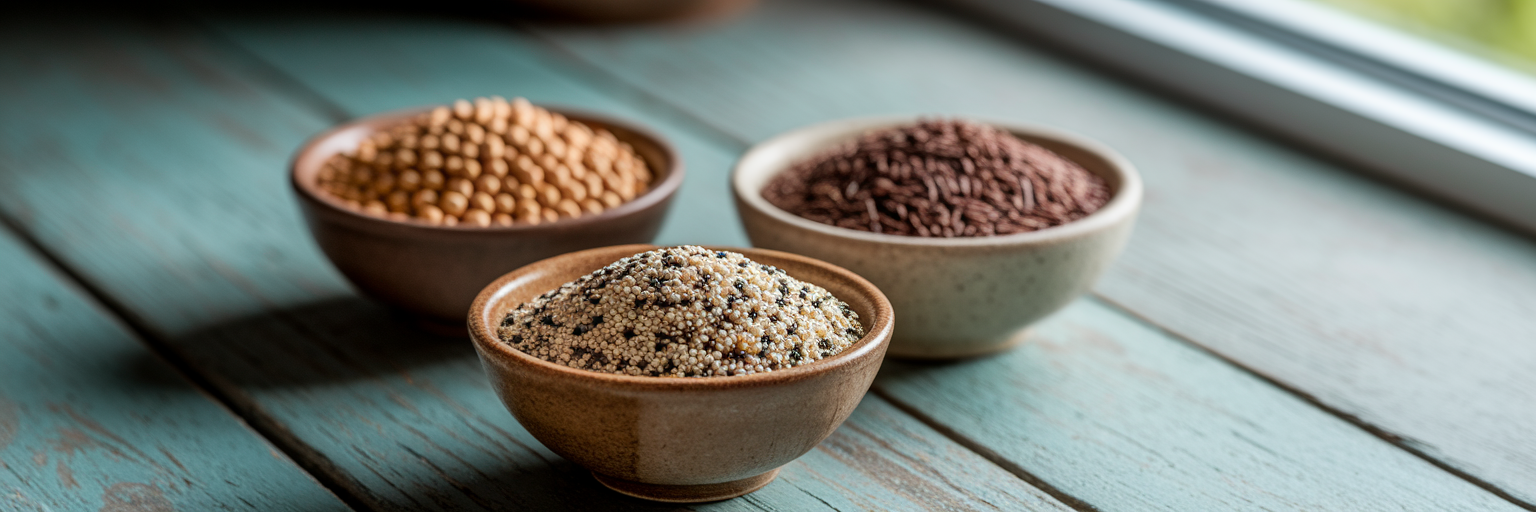Why Plant-Based Protein Is Gaining Traction with Runners
You just crossed the finish line. Your legs feel like jelly, your lungs are burning, but a wave of accomplishment washes over you. After that first sip of water, the next thought is almost always the same: "What should I eat to recover?" That immediate need for effective fuel is something every endurance runner understands deeply.
Increasingly, runners across the U.S. are turning to plant-based nutrition to answer that question. This isn't just a dietary trend; it's a strategic performance choice. Modern vegan supplements have moved far beyond the gritty, single-ingredient powders of the past. Today’s formulas are scientifically designed for athletic recovery, offering clean, powerful, and easily digestible options.
Choosing a plant based protein for endurance is a smart move for anyone serious about their training. It’s about giving your body precisely what it needs to repair, rebuild, and get ready for the next run without the digestive heaviness that can sometimes accompany other protein sources. This guide will walk you through exactly how to select a vegan protein powder that enhances your endurance and speeds up recovery, helping you train more consistently and feel stronger on the road.
The Unique Protein Needs of an Endurance Athlete
When you think of protein powder, you might picture a bodybuilder focused on getting bigger. But a runner’s protein needs are fundamentally different. Long-distance running creates microscopic tears in your muscle fibers. The primary job of protein for a runner isn't about building bulk; it's about efficiently repairing that damage to build resilience and strength for the long haul.
This repair process is called muscle protein synthesis. For runners, maintaining a consistent intake of protein helps keep the body in a state of repair and adaptation, which is essential for getting stronger from your training. Think of it less like building a new wall and more like a skilled crew constantly reinforcing a high-performance structure.
But protein’s role extends beyond just muscle. It’s also vital for producing hemoglobin, the component in red blood cells that transports oxygen to your working muscles. Better oxygen delivery means better aerobic performance. Protein also helps strengthen the connective tissues, like ligaments and tendons, which can help you stay resilient against common running injuries. While there are many options out there, understanding the landscape by exploring some of the best protein powders can provide helpful context for your specific needs.
| Factor | Endurance Runner | Strength Athlete |
|---|---|---|
| Primary Protein Goal | Muscle repair and recovery | Muscle hypertrophy (growth) |
| Ideal Protein Timing | Consistent intake throughout the day | Often focused on post-workout window |
| Key Supporting Nutrients | Electrolytes, anti-inflammatories | Creatine, higher caloric intake |
| Digestibility Priority | Very high (to avoid GI distress) | Moderate to high |
This table highlights how the specific demands of each sport shape nutritional priorities. For runners, efficient recovery and gut health are just as important as the protein itself.
Decoding Plant Protein Sources for Optimal Performance

Let's tackle a common question right away: are plant proteins "incomplete?" The short answer is no, especially when they are thoughtfully combined. A well-formulated vegan protein powder uses a blend of sources to deliver all the essential amino acids your body needs for recovery.
The Power of a Complete Amino Acid Profile
Combining different plant proteins, like pea and brown rice, creates a robust and complete amino acid profile. This is crucial because certain amino acids, particularly branched-chain amino acids (BCAAs) like leucine, act as the trigger for muscle repair. A smart blend ensures you get a potent dose of these key recovery agents in every scoop, making it an effective vegan protein powder for muscle recovery.
Why Pea Protein Is a Runner's Friend
There’s a reason pea protein is a star player in the plant-based world. The pea protein benefits for athletes are significant. It’s not only rich in those important BCAAs but also highly digestible. This means your body can absorb and use it quickly without causing the bloating or stomach discomfort that can derail a runner’s routine. Its effectiveness is on par with many animal-based proteins, making it a powerful foundation for any recovery shake.
The Gentle Strength of Sprouted Grains
Ingredients like sprouted brown rice or quinoa protein bring another layer of benefits. The sprouting process makes the nutrients within the grains more available to your body. It also reduces "anti-nutrients," compounds that can sometimes interfere with digestion. For a runner, whose digestive system can already be sensitive from the demands of training, this gentle yet effective protein source is a huge plus. A well-formulated product, like our chocolate vegan protein, often combines these sources to deliver a complete and easily digestible formula.
- Pea Protein: Exceptionally high in branched-chain amino acids (BCAAs) to kickstart muscle repair.
- Brown Rice Protein: Perfectly complements pea protein to create a complete amino acid profile and is naturally hypoallergenic.
- Pumpkin Seed Protein: A great source of magnesium and zinc, two minerals crucial for muscle function and recovery.
- Hemp Protein: Provides healthy omega-3 fats and fiber, supporting overall wellness and reducing inflammation.
Beyond Protein: Key Ingredients for Recovery and Hydration
A truly great protein powder for runners offers more than just protein. The supporting ingredients are what can make a real difference in how quickly you bounce back. Here’s what else to look for on the label.
First, look for ingredients that help manage inflammation. Long runs naturally cause an inflammatory response. Ingredients like tart cherry extract and turmeric (with black pepper for absorption) can help soothe this response. This can lead to less delayed onset muscle soreness (DOMS), that familiar next-day ache, allowing you to get back to training sooner. As publications like Runner's World often highlight, a well-rounded formula is key for performance.
Next up are electrolytes. You lose crucial minerals like sodium, potassium, and magnesium through sweat. Replenishing them is non-negotiable for proper hydration, nerve function, and preventing muscle cramps. A protein powder that includes these saves you an extra step and ensures your body is rebalanced post-run.
Pay special attention to the form of magnesium. Magnesium glycinate is a standout because it’s highly absorbable and gentle on the stomach. It plays a dual role by helping your muscles relax after a hard effort and promoting deeper, more restorative sleep, which is when the majority of your recovery happens.
Finally, consider digestive enzymes. Ingredients like bromelain (from pineapple) or papain (from papaya) help your body break down and absorb all the valuable nutrients in your shake. This ensures you get the full benefit of every ingredient without uncomfortable bloating. Answering the question of what to look for in vegan protein means looking at the entire formula, not just the protein grams.
How to Choose Your Ideal Vegan Protein Powder

Feeling ready to pick a powder? Here is a simple checklist to guide you to the best vegan protein for runners.
- Check the Protein Dose. Look for a powder that provides 20-30 grams of protein per serving. This amount is widely recognized as effective for triggering muscle protein synthesis and kickstarting the recovery process after a demanding workout.
- Look for Third-Party Certifications. Labels like "NSF Certified for Sport" or "Informed-Sport" are your assurance of quality. They mean the product has been independently tested to be free of banned substances, making it a safe choice for competitive and everyday athletes alike.
- Scan for Sugars and Additives. Your recovery fuel shouldn't cause an energy crash. Choose powders with no added sugar or those sweetened naturally with stevia or monk fruit. A clean ingredient list without unnecessary fillers or artificial ingredients is always a better choice for your gut and overall health.
- Think Holistically. The best choice is about synergy. It’s the combination of a complete protein blend, added recovery ingredients like tart cherry and electrolytes, and a clean, highly digestible formula that will truly support your running goals.
Now that you know what to look for, you can confidently choose a protein powder that works as hard as you do. To get started, you can explore some easy vegan protein recipes that you'll actually crave and make recovery feel like a treat.



